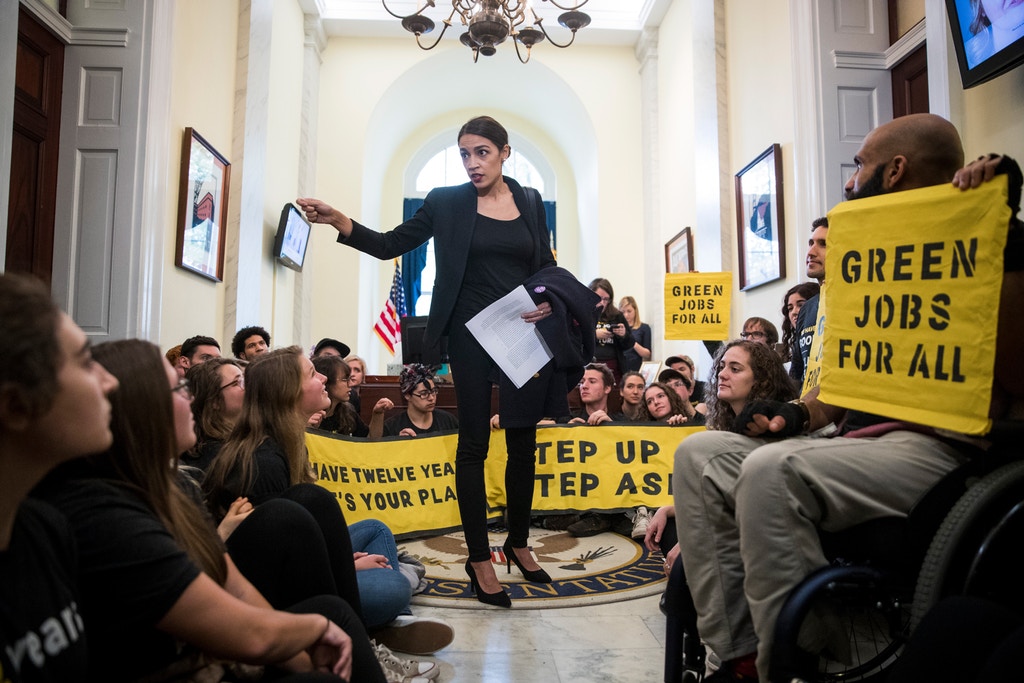
Robohub.org
Is the green new deal sustainable?
This week Washington DC was abuzz with news that had nothing to do with the occupant of The While House. A group of progressive legislators, led by Alexandra Ocasio-Cortez, in the House of Representatives, introduced “The Green New Deal.” The resolution by the Intergovernmental Panel on Climate Change was in response to the alarming Fourth National Climate Assessment and aims to reduce global “greenhouse gas emissions from human sources of 40 to 60 percent from 2010 levels by 2030; and net-zero global emissions by 2050.” While the bill is largely targeting the transportation industry, many proponents suggest that it would be more impactful, and healthier, to curb America’s insatiable appetite for animal agriculture.

In a recent BBC report, “Food production accounts for one-quarter to one-third of all anthropogenic greenhouse gas emissions worldwide, and the brunt of responsibility for those numbers falls to the livestock industry.” The average US family, “emits more greenhouse gases because of the meat they eat than from driving two cars,” quipped Professor Tim Benton of the University of Leeds. “Most people don’t think of the consequences of food on climate change. But just eating a little less meat right now might make things a whole lot better for our children and grandchildren,” signed Benton.
Americans continue to chow down more than 26 billion pounds of meat a year, distressing environmentalists who assert that the current status quo is unsustainable. While veganism would provide a 70% relief to greenhouse gases worldwide, it is not foreseeable that 7 billion people would instantly change their diets to save the planet. Robotics, and even more so, artificial intelligence, is now being embraced by venture-backed entrepreneurs to artificially grow meat alternatives as creative gastronomic replacements.

Chilean startup, Not Company (NotCo), built a machine learning platform named Giuseppe to search animal ingredient substitutes. NotCo founder Matias Muchnick explains, “Giuseppe was created to understand molecular connections between food and the human perception of taste and texture.” While Muchnick did not disclose his techniques, he revealed to Business Insider that the company has hired teams of food and data scientists to classify ingredients into bits for Giuseppe. Muchnick explains the AI begins the work of processing the “data regarding how the brain works when it’s given certain flavors, when you taste salty, umami, [or] sweet.” Today, the company has a line of egg and milk alternatives on the shelves including: “Not Mayo,” Not Cheese,” “Not Yogurt and “Not Milk.” The NotCo website states that this is only the first step in a larger scheme for the deep learning algorithm: “NotCo currently has a very ambitious development plan for Giuseppe, which includes the generation of new databases with information of a different nature, such as production processes and other molecular properties of food, in such a way that Giuseppe gets closer and closer to be the most advanced chef and food scientist in the world.”

NotCo competes in a growing landscape of other animal substitute upstarts. Hampton Creek, which recently rebranded as JUST, also offers an array of dairy and egg alternatives from plant-based ingredients. The ultimate test for all these companies is creating meat in a petri dish. When responding to the challenge, JUST announced, “Through a first-of-its-kind partnership, JUST will develop cultured Wagyu beef using cells from Toriyama prized cows. Then, Awano Food Group (a premier international supplier of meat and seafood) will market and sell the meat to clients exactly how they do today with conventionally produced Toriyama Wagyu.” Today, a handful of companies, many ironically backed by livestock corporations, are also tackling the $90 billion cellular agriculture market, including: Mosa Meat, Impossible Burger, Beyond Meat, and Memphis Meats. Mosa, backed by Google founder Sergi Brin, unveiled the first synthetic burger in 2013 at a staggering cost of nearly a half million dollars.

While costs are declining, cultured meat is too expensive to supplement the American diet, especially when $1 still buys one a fast food dinner. The key to mass acceptance is attacking the largest pain point in the lab – acquiring enough genetic material from bovine tissue. Currently, the cost of such serums are close to $1,000 an ounce, and not exactly cruelty free as they are derived from animals. Many clean meat founders are proudly vegan with the implicit goal of replacing animal ingredients altogether. In order to accomplish this task, companies like JUST have invested in building robust AI and robotic systems to automatically scour the globe for plant-based alternatives. “Over 300,000 species are in the plant kingdom. That’s over 18 billion proteins, 108 million lipids, and 4 million polysaccharides. It’s an abundance almost entirely unexplored, until now,” exclaims their website. The company boasts that it is on the verge of major discoveries, “The more we explore, the more data we gather along the way. And the faster we’ll find the answers. It’s almost impossible to look at the data and say, ‘Here’s a pattern. Here’s an answer.’ So, we have to come up with algorithms to rank the materials and give downstream experiments a recommendation. In this way, we’re using data to increase the probability of discoveries.”

The next few years will unearth major breakthroughs, already Mosa announced it will have an affordable product on the shelves by 2021. To accomplish this task, the company turned to Merck’s corporate venture arm, M Ventures, and Bell Food to lead its previous financing round. Last July, Forbes reported that the strategic partnerships are critical to Mosa’s vision in mass producing meat. According to Mosa’s founder, Mark Post, “Merck’s experience with cell cultures is very attractive from a strategic standpoint. Cell production is key to scaling cultured meat production, as they still need to figure out how to get cells to grow more rapidly and at higher numbers. In short, new technology needs to be developed. That’s where companies like Merck can lend a hand.” In addition to leveraging the conglomerates expertise in the lab, food-packaging powerhouse, Bell Food, provides a huge distribution advantage. Already, Lorenz Wyss, CEO of Bell Food Group, excitedly predicts, “Meat demand is soaring and in the future it won’t be met by livestock agriculture alone. We believe this technology can become a true alternative for environment-conscious consumers, and we are delighted to bring our know-how and expertise of the meat business into this strategic partnership with Mosa Meat.”

While the Green New Deal has been met with skepticism, the charging forces of climate change and technology are steaming ahead. Today, we have the computational and the mechatronic power to turn back the tides of destruction to implant positive change across the planet, quite possibly starting with scaling back animal agriculture. Even Winston Churchill commented in the 1931, “We shall escape the absurdity of growing a whole chicken in order to eat the breast or wing, by growing these parts separately under a suitable medium.”
Is our food source and AgTech networks under attack? Learn more at the next RobotLab on “Cybersecurity & Machines” with John Frankel of ffVC and Guy Franklin of SOSA on February 12th in New York City, RSVP Today!




